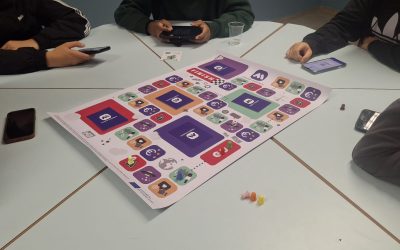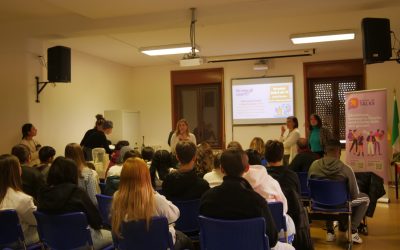Still in 2025, violence against women and gender-diverse individuals remains systemic and pervasive. On 25 November, for the International Day for the Elimination of Gender-Based Violence, we remember that this is a structural issue that increasingly manifests online, where women and individuals who do not conform to gender binaries face unprecedented harassment, threats, and digital abuse.
Preventing and combating online sexual abuse
Creating safe digital spaces, promoting consent, and ensuring protection is a collective responsibility. To address these challenges, bE-aware works to strengthen prevention, education, and awareness of online violence and abuse, providing concrete tools to protect both young people and adults.
On November 21, at the headquarters of the transfeminist collective FEMBOCS in Bagheria, we hosted an intergenerational workshop and discussion on these topics. Participants explored digital violence and shared experiences, strengthening their skills to respond effectively to online abuse.
Young members of CESIE ETS’s Youth Advisory Board (YAB) had helped prepare the event and they delivered a presentation on the key terms related to online violence, such as sextortion and cyberbullying. With support from psychologist and sexuality educator Marina Castañares, participants also explored prevention strategies and concrete actions to counter online abuse, highlighting the critical role of the community in protecting those in vulnerable situations.
We also discussed Comprehensive Sexuality Education (CSE) as a fundamental tool for preventing gender-based violence and online sexual abuse. When accessible across all age groups, CSE enables all individuals to participate in preventing discrimination and building inclusive, safe, and respectful spaces and relationships – even in digital environments.
The media play a central role in shaping narratives around gender-based violence. Often, they can perpetuate stereotypes, minimise abuse, or fuel online hate. Strengthening the capacity of media professionals to recognise these dynamics and adopt responsible storytelling practices is therefore essential.
CHASE supports this work by enhancing the skills of journalists and media professionals through educational and awareness-raising initiatives focused on critical analysis, prevention, and managing online gender-based hate.
Between 4, 6 and 11 November, the project organised Stop Hate & Change, a free training course led by international trainer Debora Barletta, Co-Coordinator of the National Network Against Hate Speech and Hate Phenomena. The course provided practical tools, real-life examples, and opportunities for discussion, helping participants recognise, report, and prevent gender-based hate speech while promoting more inclusive narratives in media and digital spaces.
This work aligns with the new European LGBTIQ+ Equality Strategy 2026–2030, which aims to strengthen protection against hate-motivated crimes and foster greater inclusion across European policies.
It is crucial to broaden our perspective and acknowledge that gender-based violence affects all individuals who experience discrimination due to their gender identity or expression, sexual orientation, or deviation from societal stereotypes. Indeed, it does not only target female bodies: it impacts all bodies seen as non-conforming and identities that are marginalised within a patriarchal system that enforces rigid roles, inequality, and power hierarchies.
Observing 25 November also means recognising the diverse, intersectional experiences of those facing discrimination – whether that is based on gender, ethnicity, class, orientation, ability – and committing to building safe spaces, respectful relationships, and a truly inclusive society.
Bringing about change across many fields
To open a broader conversation on these topics and begin creating safe spaces, CESIE ETS launched the DialoghiAMO festival. Throughout November, three events have focused on raising awareness of gender-based violence and its prevention.
In addition to the bE-aware event mentioned above, on 18 November we organised a session on equity and inclusion in sports with the Italian Referees Association – Palermo Section. The event highlighted the organisation’s pioneering work on gender equality and its role in advancing women’s participation in refereeing in Italy.
The Sport GVP workshop provided a valuable opportunity to listen and learn about gender diversity, including differences in identities and expressions. Despite being an underexplored topic in sports, participants engaged openly, deepening their understanding and contributing to a more inclusive sporting environment.
On 26 and 28 November, we will focus on preventing gender-based violence among adolescents and in schools, as well as promoting mental wellbeing. Through the Bottom-Up Talks project and in collaboration with C.O.I.R.A.G. ETS – Confederation of Italian Organisations for Analytical Group Research, two counselling and support desks will be set up in schools in Palermo, providing consistent support to students, educators, and families.
We will also present the Citizen Assembly on Comprehensive Sexuality Education, which works to ensure local contexts are considered in sexuality education and gender-based violence prevention activities in Palermo. Together, we can create an educational community capable of preventing violence through CSE and a culture of respect.
Finally, on 28 November at the ARCI Porco Rosso, in collaboration with Spazio B-UNA, we will continue the conversation with a focus on intersectionality. With the participation of expert Marina Castañares, we will explore emotional education as a crucial resource for nurturing healthy relationships. Thanks to the WeLENS project, the morning will offer participants the opportunity to engage with experts and reflect on everyday life and society with greater awareness.
DialoghiAMO: Incubating dialogue and concrete strategies
The DialoghiAMO festival serves as an incubator for debate, exchange, and collaboration among the public, schools, organisations, and professionals. Together, we can discuss, learn, and develop concrete strategies to prevent gender-based violence, promote inclusion, and strengthen wellbeing in schools, digital spaces, and society at large.
As 25 November marks the beginning of the 16 Days of Activism Against Gender-Based Violence, it reminds us that every day requires action and narratives that ensure safety, respect, and the full recognition of all identities – building a society free from discrimination, violence, and taboo.









